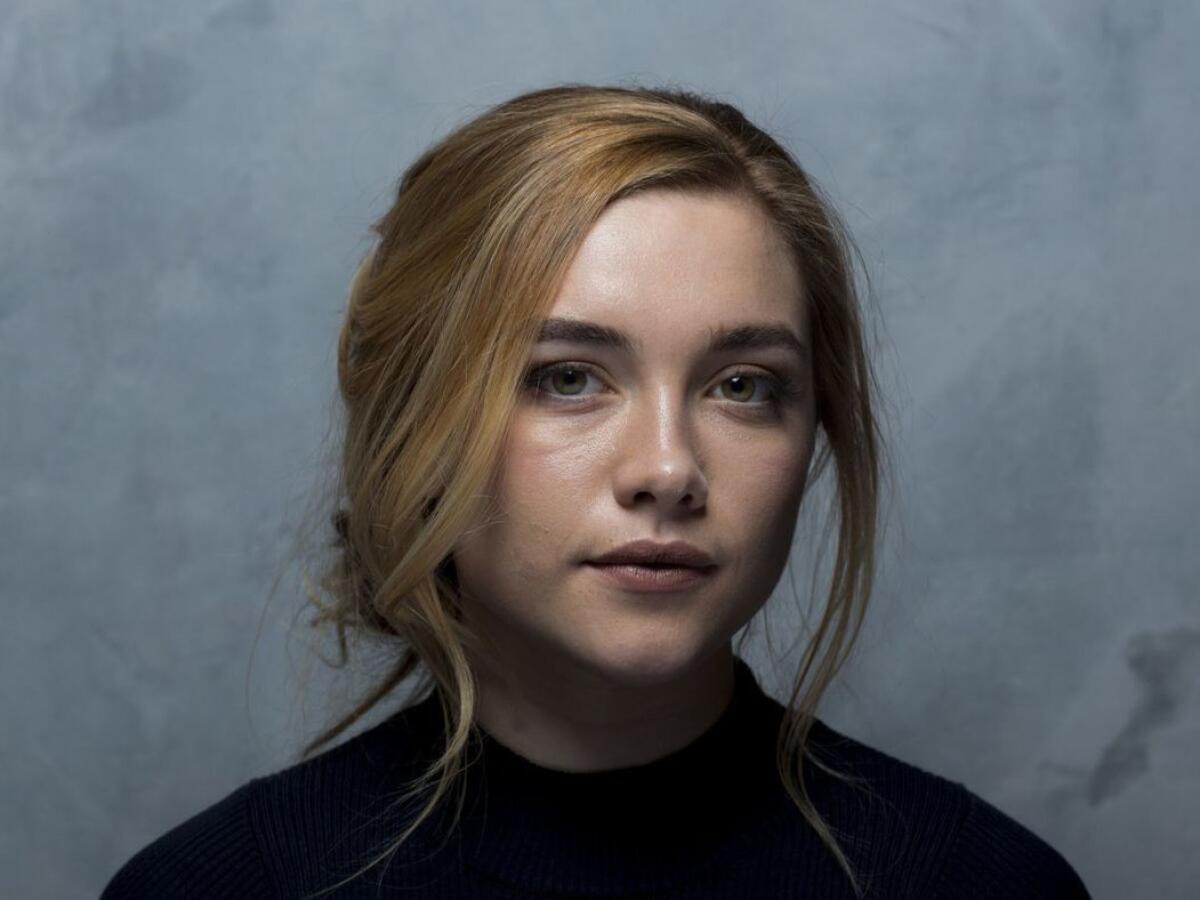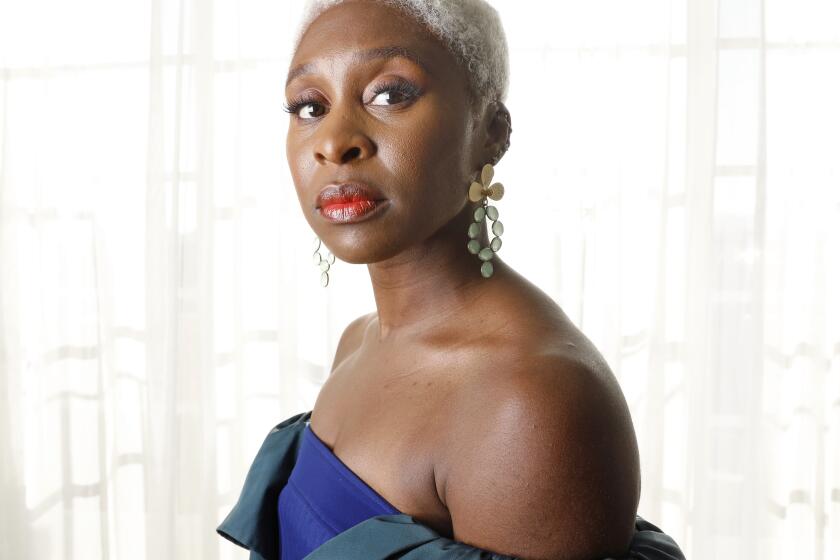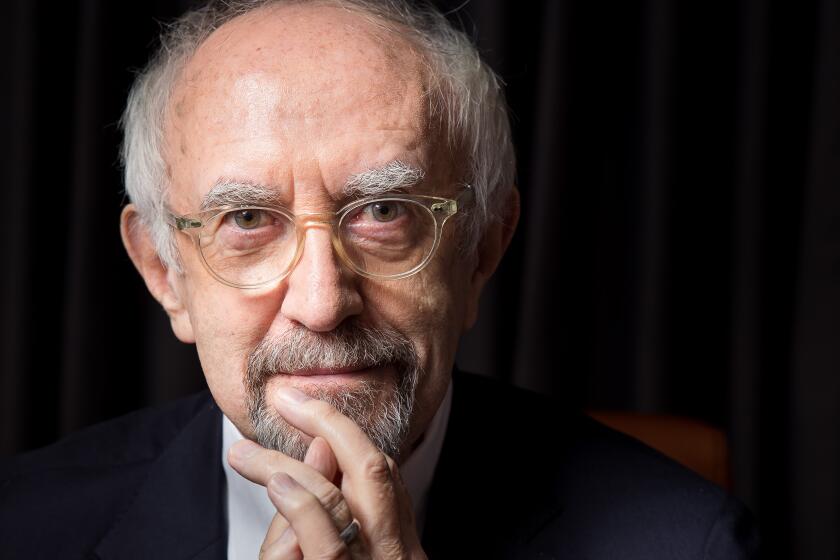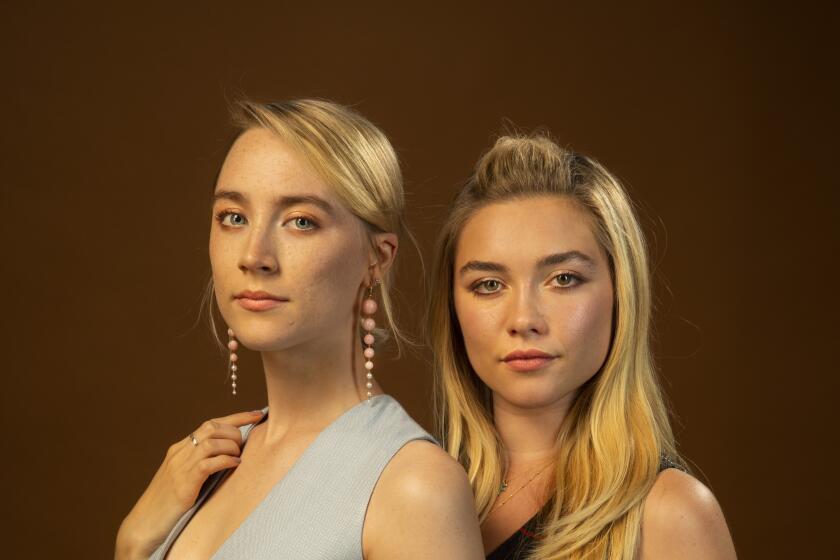Screaming, laugh-crying and paparazzi: First-time Oscar nominees on hearing their names

For five of the nominees announced earlier this month for acting Oscars, it was the first time they’d heard their names called out. Veterans and newcomers alike were honored — Antonio Banderas (“Pain and Glory”), Cynthia Erivo (“Harriet”), Scarlett Johansson (“Marriage Story” and “Jojo Rabbit”), Jonathan Pryce (“The Two Popes”) and Florence Pugh (“Little Women”). Four of these first-timers shared with The Envelope how it feels for them.
Antonio Banderas, Salvador Mallo in “Pain and Glory”
You’ve worked with director Pedro Almodóvar eight times over 40 years. What was different about “Pain and Glory”?
What are the odds that you have to work with a director who is actually the character you are playing? The information you are getting from the director — especially everything that has to do with emotional information — that is something you cannot write in the script, but you can see in his eyes.
It was a very pleasant shooting, which is not normal. Almodóvar is a very tough director, very meticulous and demanding. But in this particular case, I don’t know if it was because of the subject [loosely based on the director’s life] or because I was coming still from a heart attack [which he suffered in 2017] that provided me with a strange way to look at life I didn’t have before — less anxiousness to show things, more receptive to the things that are surrounding you.
Longtime friends and collaborators Pedro Almodóvar and Antonio Banderas still had things to discover about each other while making “Pain and Glory.”
Who was the first person you wanted to tell?
I was with the mayor here, talking about the future of Málaga [Spain] and a second theater I want to build, it’s attached to a school. We have 600 students there studying singing and dancing and acting. I had my phone closed and suddenly I looked at the phone and I saw Pedro Almodóvar’s movie was nominated and I thought my category had gone first, so I thought that was it. And suddenly the phone is going ‘ping, pong, ping, pong, ping ping ping ping ping ping’ — it was crazy, I couldn’t believe it. In 20 minutes, there were 100 paparazzi out there. As much as I am not very keen to paparazzi, I loved them that day.
Whom do you have to thank?
My girlfriend, who saved my life when I had the heart attack. The night before, she had a headache and we didn’t have anything in the house. She went to the supermarket and got some aspirin. As she was leaving, the girl told her she had dropped something; it was the aspirin. The next morning, when I came out of my gym in the house, I said to her, ‘I think I’m having a heart attack.’ She took an aspirin and put it under my tongue. That thing saved my life. So if the girl, the cashier, hadn’t said anything; if she hadn’t had a headache that night … sometimes the packages in which life serves you happiness are very small, and they come to you in an unexpected way.
Cynthia Erivo, Harriet Tubman in “Harriet”
What separated the project from your other work?
It was the complexity of bringing this real person to life, not just as a hero, but as somebody who loved, had love, had heartbreak. I have a thing about trying to find the most complicated, different women you wouldn’t hear from normally and I think Harriet was one.
With her first Oscar nominations, ‘Harriet’ star Cynthia Erivo could become the youngest EGOT winner
Cynthia Erivo is one step closer to EGOT status with an Oscar nomination for her turn as the iconic freedom fighter and suffragist Harriet Tubman in Kasi Lemmons’ ‘Harriet.’
How was the response different than to your other film work?
I’d get videos from — there was this mother and daughter in their car, they had just seen the movie, and they sent this message about how they felt empowered as women. An entire school went to see the film and I contacted this teacher there and had a Q&A with them. I’d never experienced people banding together to go and see something in droves.
Who had the most memorable response to the news of your nomination?
My cousin in London had no idea what was going on. She had messaged me that day just to find out how I was. “Cynthia, just checking on you …” I called her: “Have you been near the news or TV or anything like that?” “No, what’s going on?” “Well, I’ve been nominated for two Oscars.” “No. No, you haven’t. Oh my God!” Then I listened to her go through the seven stages of grief, but they were seven stages of elation. Hilarious. That was the most memorable reaction.
Jonathan Pryce, Pope Francis in “The Two Popes”
What was different about this role?
This feels like a celebration of a man I greatly admire. I’m not particularly religious; this was the first priest I felt like was speaking to me, as a non-Catholic, and speaking to the rest of the world about issues we should all be involved in politically and practically and doing something about. The climate crisis, the refugee crisis, the economy, inequality in society. So I felt a great deal of empathy toward him. To play him is a privilege, more than anything. We don’t shy away from the fact that he was a divisive figure in Argentina and is still seen by many as a divisive figure. He’s a complex and a multilayered man and that makes for a complex and multilayered characterization.
Why Jonathan Pryce earned top billing on the set of “The Two Popes.” And how Sir Anthony Hopkins found a way to deal with it.
Who was the first to call you after the nomination was announced?
I think the first phone call I got was from one of my sons, who was thrilled. I was in an odd state of kind of laughing-crying. I hadn’t expected any kind of emotional reaction because I’m quite cool about all of these awards things, normally a bit cynical about it all. Earlier that morning I had been talking to my son about the betting odds and he said he was sorry he hadn’t put a bet on me. I said, ‘What are [the odds]?’ He said, ‘You don’t want to know,’ because they weren’t good.
Whom must you thank?
Fernando Meirelles, definitely. He was absolutely the right person to make this film. And Anthony Hopkins. We had a great working relationship and became friends. What you see on the screen was mirrored off screen. Tony and I have yet to tango, but maybe on the night of the ceremony.
Florence Pugh, Amy March in “Little Women”
Was working with adapter-director Greta Gerwig unusual?
She hears a scene — she’ll know who it was that wasn’t right and how she wants it to sound and where it should crescendo. She kind of orchestrates us like a conductor. That was very new to me; it was exciting to work like that.
Greta Gerwig reinvents the literary classic “Little Women” with Saoirse Ronan as a formidable Jo and Florence Pugh as a vibrantly complicated Amy.
When did you become aware the response to your work was so positive?
After screenings, I had so many people tell me that secretly they’d always been an Amy and they’d never been able to admit that, and now that we’d given this new representation, they all feel like they can be a proud Amy. I did think how awful it was that, sadly, this woman has been tarnished with being a brat. Actually, she’s equally a very ambitious, driven, creative woman, but none of that is recognized because she wasn’t [that way] in the book. Hearing people now proudly looking up to her was probably one of the first moments of, “Oh wow, I think we’ve done something.”
Who was the first person you had to tell?
I called my mom on FaceTime; we both were screaming for two minutes. I called my dad, and just as I was about to say I was nominated for an Oscar, his phone went dead. He had to find out through the internet.
What did your mom say?
She was just screaming. You don’t have to talk when you’re family. You can just scream and you’ll get it.
More to Read
Only good movies
Get the Indie Focus newsletter, Mark Olsen's weekly guide to the world of cinema.
You may occasionally receive promotional content from the Los Angeles Times.















